- Home
- Beverly Cleary
The Luckiest Girl Page 14
The Luckiest Girl Read online
Page 14
“Katie, what an expression!” said Mavis with a laugh. “What would your grandmother think if she could hear you?”
Eagerly Katie pulled the string off the package, threw the brown paper on the floor, and opened the box. Shelley saw the pleasure on her face fade to disappointment and then to dislike.
“What’s the matter?” asked Mavis.
“It’s a sweater,” answered Katie in a flat voice.
“Just what you’ve been wanting,” said Mavis. “Let’s see it.”
Katie held up the sweater briefly and then dropped it back into its box.
“Why, it’s a lovely sweater,” said Mavis.
Shelley agreed. The sweater was a delicate apricot color becoming to Katie. It was knit of soft yarn with a double row of cable stitch down the front. “You’re certainly lucky,” observed Shelley. “It’s just right to wear with your brown skirt.”
Katie looked obstinate.
“Katie, you’re acting as if you don’t like the sweater,” said Mavis.
“I won’t wear it!” Katie was so vehement that even Sarge lifted his nose from his paws to look at her.
“Katie!” exclaimed Mavis. “Of course you’ll wear it.”
“No, I won’t,” said Katie, “and nobody can make me!”
Inwardly Shelley was embarrassed. This all sounded much too familiar. She and her mother had said these same words so many times.
Mavis began to sound impatient. “Now why on earth should you refuse to wear a beautiful sweater like this?”
Katie stared at the floor. “It’s hand-knit,” she said finally. “With cable stitch.” She made cable stitch sound like something peculiarly loathsome.
Mavis could not help laughing. “Katie, how ridiculous,” she said. “That makes the sweater all the more lovely.”
“I’m not ridiculous,” said Katie resentfully. “I don’t see why you have to go around saying I am ridiculous all the time.”
Mavis ignored this outburst. “Katie, you couldn’t go into a store and buy a sweater as lovely as this,” she pointed out.
“I don’t want to go into a store and buy a sweater like this,” said Katie stubbornly.
Mavis’s controlled patience reminded Shelley of her own mother. “But dear,” said Mavis, “why don’t you want to wear a hand-knit sweater?”
“Nobody wears hand-knit sweaters,” said Katie. “The kids would make fun of me.”
“No, they wouldn’t,” contradicted Mavis gently.
And they probably would, too, thought Shelley, remembering how her classmates had behaved about any unusual clothing when she was Katie’s age. If they did not openly make fun of her, they would somehow make her feel as if there were something odd about her appearance.
“What kind of sweater would you prefer?” asked Mavis curiously.
“A plain old Orlon sweater from Penney’s,” said Katie emphatically. “The kind the rest of the kids wear.”
“Oh, Katie!” Mavis’s exclamation was a mixture of amusement, impatience, and irritation.
“Mother, you just don’t understand,” protested Katie.
“That seems to be a favorite phrase of yours,” commented Mavis.
“Well, you don’t understand,” said Katie, “and I am not going to wear the sweater!”
“Of course you’ll wear the sweater,” said Mavis firmly. “You have been needing a sweater and now you have one, a very becoming one. And what is more, your grandmother is coming to visit us in a few weeks and I shall expect you to behave yourself.”
“I’ll freeze to death first.” Katie thrust up her chin and stared out the window.
Shelley tried not to smile. She knew Katie was thinking, I’ll freeze to death and then you’ll be sorry.
“That would be pretty hard to do in San Sebastian,” remarked Mavis dryly.
“Oh, Mother!” Katie was angry. “Why do you always have to go and say things like that? Why can’t you ever understand?”
“I don’t know,” said Mavis wearily. “But I do understand one thing. You are going to wear that sweater and no more nonsense. You know what your father would say.”
Katie was silent as a variety of emotions passed over her face. Anger, stubbornness, the brink of tears. Finally she settled on haughtiness. “All right, I’ll wear the old sweater,” she said coldly as she pulled it out of its box and jammed her arms into the sleeves. “Come on, Sarge, let’s go.”
The dog rose from the rug, shook himself, and trotted over to the door. Katie paused dramatically with her hand on the doorknob. “Why do I have to have a grandmother who knits?” she asked rhetorically before she flounced out, slamming the door behind her.
Poor Katie. Shelley’s impulse was to run after her and say, It’s all right about the sweater—really it is. All Katie needed was to feel that she was as attractive as Pamela, and to have Rudy dance with her at dancing class, and then it wouldn’t matter what kind of sweater she wore. But it would not do any good to tell Katie this. She would not believe it until she found out for herself, just as Shelley had to learn about the raincoat for herself.
Mavis sank back into her chair with a sigh. “Well, I hope slamming the door makes her feel better.”
“It probably does,” said Shelley. “Where does her grandmother live?”
“Up in Carmel-by-the-Sea,” answered Mavis. “She has a little house that she lives in during the winter and rents out during the tourist season while she visits her children or travels. She expects to come down early this year, because she has it rented for the entire season to an elderly couple from the Valley who want to escape the heat.”
The house was quiet without Katie clumping up and down the stairs. In the distance, through the grove, Sarge’s barks could be heard. There seemed to be nothing for Shelley to add to the conversation. “Well, back to the salt mines,” she remarked, and carried her books up to her room.
Shelley spent the rest of the afternoon reading the next chapter in her biology book, with frequent pauses when she propped her chin on her fist, stared out the window, and composed letters to her mother and to Rosemary. Dear Mother and Daddy, I can’t imagine how I happened not to mention Hartley lately. Just a lapse of memory, I guess. He is in my journalism class and I see him all the time. More than I see Philip, really…Dear Rosemary, Where on earth did you ever get the idea I was practically surrounded by basketball players? I may know one or two but I also know an interesting journalism student. I may have mentioned him before. His name is Hartley Lathrop and he…
And he what, Shelley asked herself. It was not going to be easy to give the impression that Hartley was important to her if she saw him only in the classroom. It would be a good idea, even fun, to see him outside the classroom, but she did not see how this could ever happen. If only she had explained her peculiar behavior the time he said good night to her, things might be different now.
Shelley stared out the window and turned over in her mind the one date she had shared with Hartley. From the garage came a feeble pop-pop-poping sound from Luke’s motorcycle. Sarge’s bark in the distance reminded Shelley of Katie, and as she listened she wondered what Katie was going to do about the sweater. She would not wear it to school. Shelley was sure of that. Not a girl like Katie.
It was almost suppertime before Katie appeared. She came through the back door into the kitchen, where Shelley was helping Mavis prepare the meal. “Mommy!” cried Katie. “Just look what happened.”
The front of the sweater was covered with muddy streaks and a large raveled hole was torn in one side, revealing more muddy streaks on the white blouse she was wearing under the sweater.
“Katie, I’m surprised at you,” said Mavis coldly.
“But Mommy,” protested Katie with conspicuous innocence, “I couldn’t help it. I was running along with Sarge in the grove and I picked up a stick for him to fetch and before I could throw it, he jumped up on me and tore my sweater. Honest, Mommy, it all happened so fast I didn’t even know what was happening.”
Shelley watched fascinated. Surely Mavis would not let Katie get away with this.
“Don’t you believe me?” asked Katie, wide-eyed.
“No, I do not.” Mavis dropped a lump of butter into a pan of peas. “Take your sweater off,” she said mildly. “After supper you must write your grandmother a nice thank-you letter. And we won’t be able to buy you a new sweater. We do not waste clothing in this household.”
“Mommy,” exclaimed Katie tragically, “I don’t see why you don’t believe me.”
Mavis looked levelly at her daughter. “Supper is almost ready,” she said.
After supper Katie went to her room without having to be told, and in half an hour she appeared with a sheet of notepaper in her hand. “Is this all right, Mommy?” she asked.
Mavis took the letter and read it carefully. “Except that there are two p’s in appreciate, it is a very nice letter.”
“Okay, I’ll fix it,” agreed Katie cheerfully.
“And when your grandmother comes to visit us perhaps she can reknit the part of the sweater that was torn,” said Mavis.
Katie groaned, but it was a cheerful groan. She had worked something out of her system and as far as she was concerned, the incident was closed. She sat down on the couch and said softly, as she curled up beside her mother, “Mommy, tell me what it was like in the olden time when you were a little girl.”
Mavis smiled down at her daughter and glanced toward Shelley, explaining in her glance that this was a family joke. “In the olden time when I was a little girl,” she began, as if she were telling a story, “there were no nylon stockings or Kleenex. Ladies wore silk stockings and little girls learned to iron by practicing on linen handkerchiefs. And three times a week a truck came down the street bringing ice for the iceboxes in people’s kitchens, and all the neighborhood children climbed onto the back of the truck to pick up bits of ice to suck….”
Shelley smiled at Mavis and her daughter as she listened. So the argument about the sweater was all over. Neither had won. Mavis had not succeeded in making Katie wear a sweater she did not want to wear, and Katie would have to go without a new sweater that she needed. And yet somehow it made no difference in their feelings toward each other. Maybe that was the way it was with mothers and daughters. Nobody ever really won.
That sweater was to Katie as roses in the Disposall were to me, thought Shelley, stating the whole thing like an algebra problem. But this was a problem that could not be solved by algebra. That was the trouble with people—they didn’t fit into formulas. Perhaps every girl had to throw roses into the Disposall at some time, because that was part of growing up. And suddenly Shelley knew that this was true. She did not understand why, but she knew that it was true.
Shelley knew then that she was not going to be haunted by those roses nearly so much, now that she knew she was not alone in her rebellious feelings. But she still had another problem to occupy her mind and she turned her thoughts to it now—how she was going to keep her mother from knowing why Philip did not come to see her anymore. She would have to mention Philip less and less and write about Hartley more and more…. There must be some way she could make Hartley take an interest in her again….
“And in the olden time when I was a little girl,” Mavis continued, “cars did not have heaters or radios. Everyone carried an auto robe for people who rode in the backseat to put over their legs in winter. Some cars had little vases for flowers on the dashboard—”
“Flowers on the dashboard?” Katie murmured sleepily. “Mommy, you are just making it up.”
Shelley was happier than she had been since the day she received her D in biology.
Chapter 12
At school Shelley set out to recapture Hartley’s interest, not only to be able to write home about him, but because she missed the companionship of a boy. She managed to walk down the hall toward the journalism room a step ahead of him. Since they shared a common destination, Hartley naturally caught up with her.
“Oh, hello, Hartley,” said Shelley, acting surprised to see him. “I liked that personal interview you wrote for class last week. It was different from what most of the class wrote.”
“Thanks, Shelley.” Hartley was pleased by her compliment. “I think a lot of interviews printed in the school paper are pretty silly. You know, the reporter always asks what was the subject’s most embarrassing moment and who is his current heart interest. I thought I could make an interview with the janitor more interesting than that stuff.”
“You did,” Shelley assured him.
“By the way, have you decided what you are going to do for that informative interview assignment?” Hartley asked.
“Not yet,” admitted Shelley as they entered the journalism room. “Mrs. Boyce said it was all right to go to church and write up the sermon, but that doesn’t seem like a real interview.”
“I haven’t thought of anything either,” said Hartley. “I suppose I could interview my dad on the state of citriculture in California.”
“But interviewing your father doesn’t sound like a real interview either,” said Shelley.
“I know,” agreed Hartley, “but I haven’t thought of anybody better.”
“Me either,” said Shelley, thinking that perhaps this was her chance. If she could think of a really good subject, she and Hartley might interview him together if she suggested it in the right way. But the subject would have to be interesting and unusual. Hartley was serious about journalism, as he was about all his subjects.
That evening Shelley was still trying to think of someone to interview as she picked up the San Sebastian Argus-Report and glanced idly through its pages. She was thinking that it was a gossipy little paper, compared to the newspapers she had grown up with, when the photograph of an elderly man caught her attention. “Bard to Appear” was the caption and beneath it, in smaller type, Shelley read, “Jonas Hornbostle, noted poet and winner of the Biddle Prize for Poetry, will appear at the Swancutt Hall of Music, Orange Belt College, Vincente, Saturday afternoon at two thirty. Mr. Hornbostle will read from his own works, which include such distinguished works as Litany for a Lizard and Prairie Depot.”
A real live poet, and Jonas Hornbostle at that! Shelley meditated on this bit of information. She had not realized that Jonas Hornbostle was still living—so many people whose works were required reading in English were dead. Jonas Hornbostle, whose poem Buffalo Bones was included in the textbook for English 5. Shelley preferred the poetry of Edna St. Vincent Millay, but she was impressed by the works of Jonas Hornbostle, who rarely used rhyme and who wrote so vigorously about earthy subjects. Shelley examined his picture more closely. The poet had a shock of unruly gray hair and heavy dark eyebrows. The photograph revealed every pore and every line in his face as he appeared to be squinting into the sun at some distant object, an eagle perhaps.
Shelley dropped the paper. She knew exactly what she was going to do. She was going to tell Hartley that she intended to interview Jonas Hornbostle. If she told him in the right way, perhaps he would suggest they go together to the Swancutt Hall of Music, hear Jonas Hornbostle read his poetry, and then go backstage to interview him. That would really be something to write home about!
The next morning, in their registration room, Shelley turned around to Hartley the first thing and said, “I have a marvelous idea for that interview assignment.”
“Who’s your victim?” asked Hartley.
“Jonas Hornbostle,” Shelley announced.
“Hey!” exclaimed Hartley. “Smart girl! I read about him in last night’s paper and didn’t even think about interviewing him. I guess I thought he was too famous.”
“There is no reason why two members of the class can’t interview the same person, is there?” Shelley hoped this would give Hartley the right idea.
“No, I guess not.” Hartley frowned. “Darn it all, anyway. This is the one Saturday afternoon that I can’t go. But it sure is a good idea and I wish you luck. Meeting a famous poet sho
uld be interesting.”
“Yes,” agreed Shelley, with less enthusiasm. Somehow it had not occurred to her that she might have to do this interview alone. She had counted on Hartley’s presence to give her courage, and now she was frightened at the thought of facing the famous man without him.
“Be sure you let me read the interview before you hand it in,” said Hartley. “I’d like to see it.”
“Of course,” agreed Shelley. Letting Hartley read her story should be an inspiration to her, because she would not want to show him a poor piece of work. She valued his opinion too much.
When Saturday afternoon arrived, Mavis’s insistence that she take the station wagon rather than the bus added to Shelley’s pleasure and excitement at the afternoon before her. It was one of those California days that seemed to belong to no season at all. She felt very mature to be driving alone past the groves where crews on ladders were picking oranges, past the used-car lots and the Giant Orange on her way to meet a famous poet. Mr. Hornbostle? My name is Shelley Latham, she would say. And he would answer, Shelley—a poet’s name. Well, no, he probably wouldn’t, because he was an earthy poet, but it would be nice if he did. And if he did, could she put it in the interview without sounding as if she were bragging? Yes, of course she could. Anything he said would be part of the interview. Such a remark was full of human interest and belonged in the interview with a real live poet. Accuracy, accuracy, accuracy Mrs. Boyce always stressed in journalism class. Shelley mentally sharpened a pencil and prepared to be accurate, accurate, accurate.
Shelley began to recite in ringing tones as she drove toward Vincente:
“‘Highway 30 bisects the sod where once they lay.
Bison bones
Bleached by sun, leached by rain…’”
She wished she could remember more than the first three lines of Buffalo Bones. What she did remember was looking up leach in the dictionary when she studied the poem. It would be so much easier if Jonas Hornbostle wrote poetry with a regular rhyme scheme. Oh, well. “‘Highway 30 bisects the sod,’” she repeated.

 Ramona Quimby, Age 8
Ramona Quimby, Age 8 Dear Mr. Henshaw
Dear Mr. Henshaw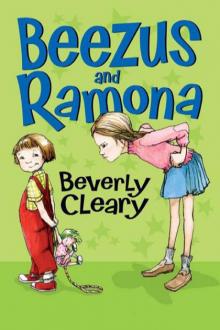 Beezus and Ramona
Beezus and Ramona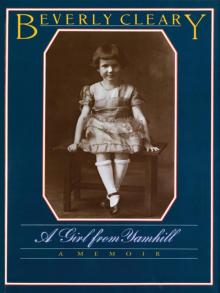 A Girl from Yamhill
A Girl from Yamhill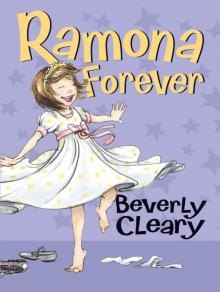 Ramona Forever
Ramona Forever Jean and Johnny
Jean and Johnny The Luckiest Girl
The Luckiest Girl Emily's Runaway Imagination
Emily's Runaway Imagination Ribsy
Ribsy Ramona the Pest
Ramona the Pest Socks
Socks Ramona's World
Ramona's World Strider
Strider The Mouse and the Motorcycle
The Mouse and the Motorcycle Henry and the Paper Route
Henry and the Paper Route Ramona the Brave
Ramona the Brave Henry Huggins
Henry Huggins Ramona and Her Mother
Ramona and Her Mother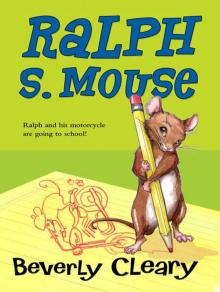 Ralph S. Mouse
Ralph S. Mouse Sister of the Bride
Sister of the Bride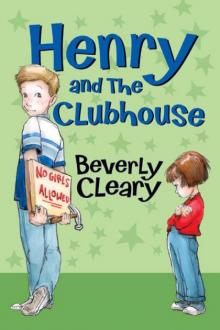 Henry and the Clubhouse
Henry and the Clubhouse Muggie Maggie
Muggie Maggie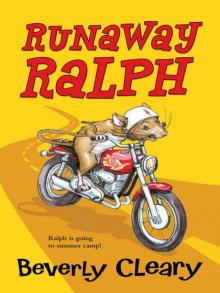 Runaway Ralph
Runaway Ralph Ramona and Her Father
Ramona and Her Father Henry and Ribsy
Henry and Ribsy Henry and Beezus
Henry and Beezus Two Times the Fun
Two Times the Fun Fifteen
Fifteen Mitch and Amy
Mitch and Amy